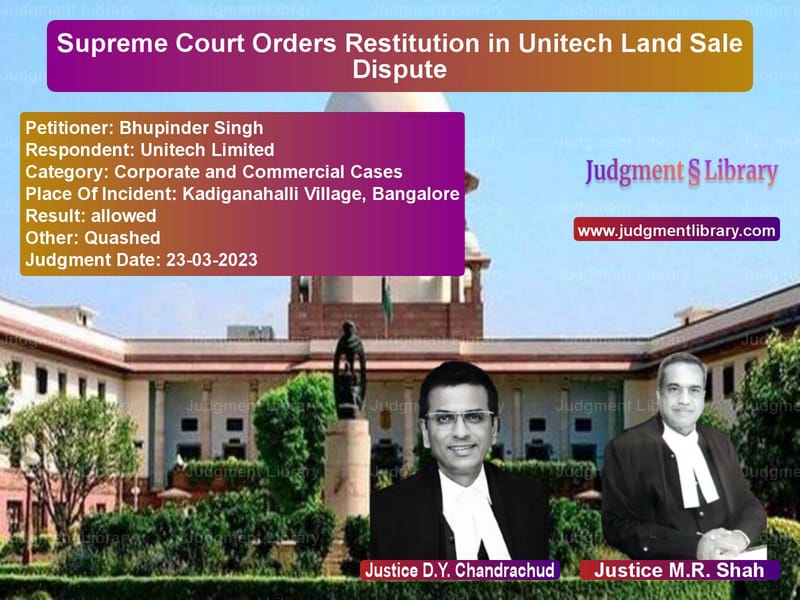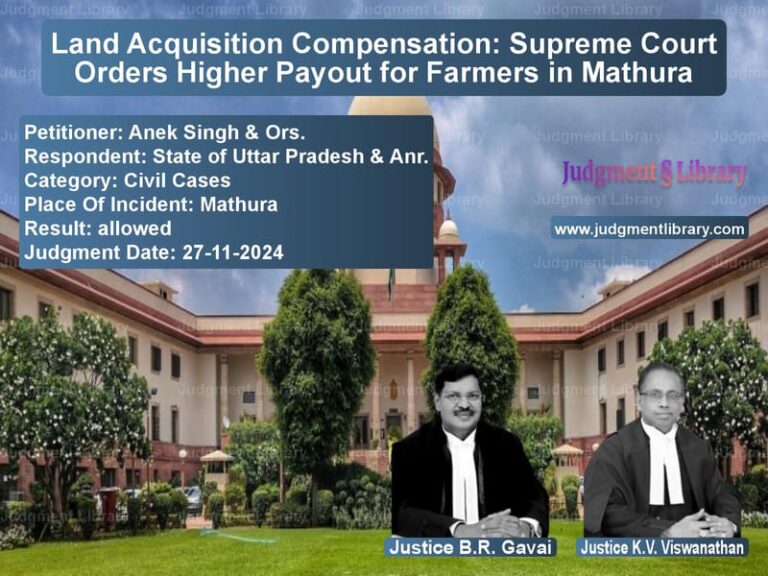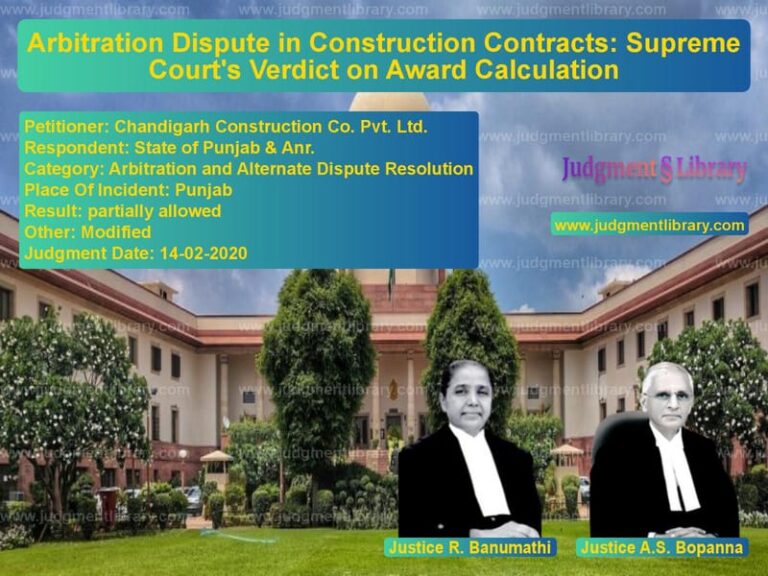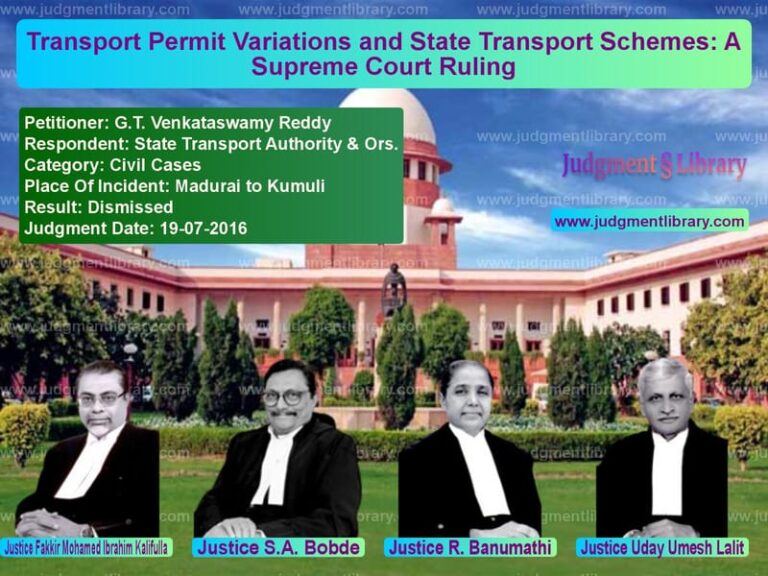Supreme Court Orders Restitution in Unitech Land Sale Dispute
The case of Bhupinder Singh vs. Unitech Limited is a complex legal matter involving disputed financial transactions over the sale of land by Unitech Limited. The case highlights critical issues related to fraud, financial mismanagement, and the application of the principle of restitution. The Supreme Court was called upon to determine whether funds received by third parties from the sale of Unitech’s land should be returned, given that their claims had not been properly adjudicated.
Background of the Case
The dispute arose from the sale of 26 acres and 19 guntas of land owned by Unitech Limited in Kadiganahalli Village, Bangalore. The land was sold to M/s Devas Global Services LLP, and the sale transaction was confirmed through earlier Supreme Court orders. However, Unitech Limited later challenged certain financial transactions related to the sale, claiming that significant sums had been wrongly appropriated by third parties—Shri Naresh Kempanna and Col. Mohinder Khaira.
Unitech Limited argued that it was the absolute owner of the land and was entitled to the entire sale consideration of Rs. 172.08 crores. However, out of this amount, only Rs. 87.35 crores were received in the Supreme Court Registry, while Rs. 56.11 crores were appropriated to Naresh Kempanna and Rs. 41.96 crores to Col. Mohinder Khaira. Unitech Limited contended that these payments were made based on an unverified Memorandum of Understanding (MOU) dated January 2, 2018, without any adjudication of the rights of the parties.
Unitech Limited’s Arguments
Unitech Limited, represented by its legal team, presented the following arguments:
- The company was the absolute owner of the land in question, and neither Shri Naresh Kempanna nor Col. Mohinder Khaira had any legal ownership rights over it.
- The payments of Rs. 56.11 crores and Rs. 41.96 crores to these two individuals were made without proper adjudication of their claims.
- The Dhingra Committee, which had reviewed the matter, did not fully investigate the legitimacy of their claims before recommending payment.
- The misallocation of funds harmed Unitech’s stakeholders, including home buyers, fixed deposit holders, and employees.
- The principle of restitution should be applied to correct the wrongful payments.
Respondents’ Arguments
Shri Naresh Kempanna and Col. Mohinder Khaira opposed Unitech’s claims, arguing that:
- The payments to them were made based on an MOU and prior Supreme Court orders.
- The Dhingra Committee had reviewed their claims before recommending payments.
- They had legitimate claims over the land transaction.
- Any reversal of payments should follow proper legal procedures.
Supreme Court’s Analysis
The Supreme Court examined the evidence and found that the payments to Shri Naresh Kempanna and Col. Mohinder Khaira had been made without proper adjudication of their claims. The Court observed:
“Justice Dhingra Committee submitted the report to pay the said amount to the aforesaid two persons without any adjudication of the claims of Unitech, M/s Devas, and the aforesaid two persons. There was an obvious error and/or mistake on the part of this Court in directing the payments.”
The Court further cited the principle of restitution, stating:
“The principle of restitution is founded on the ideal of doing complete justice at the end of litigation, and parties have to be placed in the same position but for the litigation and interim order, if any, passed in the matter.”
Final Judgment and Restitution Order
The Supreme Court ruled in favor of Unitech Limited, ordering Shri Naresh Kempanna and Col. Mohinder Khaira to return the funds with 9% interest from the date of receipt. The Court also granted them the liberty to file appropriate legal proceedings if they wished to assert any legitimate claims over the sale proceeds.
The ruling emphasized that courts must correct their mistakes when they inadvertently approve transactions that lack proper legal scrutiny. By invoking the principle of restitution, the Supreme Court ensured that any undue financial advantage gained due to a wrongful judicial order was neutralized.
Conclusion
This judgment serves as a crucial precedent in corporate and financial litigation, reaffirming that courts have the duty to rectify financial misallocations and uphold justice. It also highlights the importance of thorough judicial scrutiny before disbursing large sums of money in disputed transactions.
Petitioner Name: Bhupinder Singh.Respondent Name: Unitech Limited.Judgment By: Justice D.Y. Chandrachud, Justice M.R. Shah.Place Of Incident: Kadiganahalli Village, Bangalore.Judgment Date: 23-03-2023.
Don’t miss out on the full details! Download the complete judgment in PDF format below and gain valuable insights instantly!
Download Judgment: bhupinder-singh-vs-unitech-limited-supreme-court-of-india-judgment-dated-23-03-2023.pdf
Directly Download Judgment: Directly download this Judgment
See all petitions in Company Law
See all petitions in Corporate Governance
See all petitions in Shareholder Disputes
See all petitions in Bankruptcy and Insolvency
See all petitions in unfair trade practices
See all petitions in Judgment by Dhananjaya Y Chandrachud
See all petitions in Judgment by Mukeshkumar Rasikbhai Shah
See all petitions in allowed
See all petitions in Quashed
See all petitions in supreme court of India judgments March 2023
See all petitions in 2023 judgments
See all posts in Corporate and Commercial Cases Category
See all allowed petitions in Corporate and Commercial Cases Category
See all Dismissed petitions in Corporate and Commercial Cases Category
See all partially allowed petitions in Corporate and Commercial Cases Category







